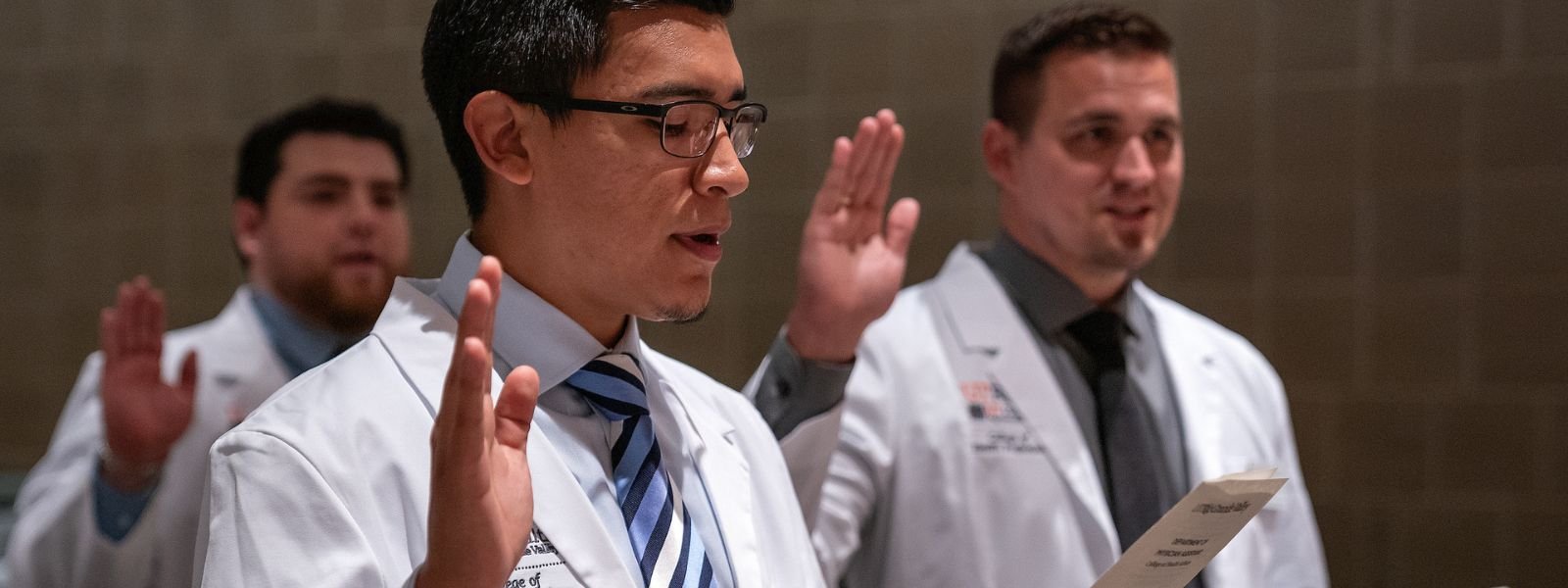Policies
The Department of Physician Assistant does not offer waivers for any pre-requisite coursework. Additionally, the Department does not offer waivers, advanced placement, or proficiency exams for any coursework. All students must complete the entire professional curriculum while enrolled at UTRGV.
The Department of Physician Assistant does not admit students from other physician assistant programs. All currently or formerly enrolled physician assistant students at other physician assistant programs must participate in a competitive admissions process along with all other applicants.
The DPA does not offer deceleration for academic, professionalism, or behavioral conduct issues. Students are expected to maintain the academic pace of their cohort. This does not allow students to drop classes or decelerate once matriculated. Dropping classes results in dismissal from the program. Students with an approved non-academic leave of absence may be required to meet the proficiencies for consideration of reinstatement and may join the next cohort, depending on the length of the leave.
The PAD curriculum has been designed to be a full-time program for students. It consists of a very demanding course load with a great deal of time spent in class and clinical experiences. There are also special seminars, guest lecturers, and community service-learning projects that may be scheduled on relatively short notice.
We encourage you to seek outside sources of support (scholarships, loans, grants, etc.) and to devote as much time as possible to your professional education. Employment while enrolled in the program is strongly discouraged. A3.15.e
Physician assistant students are not allowed/required to work for the DPA. A3.04 Students may not serve as an instructional faculty and will not be substituted for regular staff. Students are prohibited from substituting for clerical and/or clinical personnel during first year clinical experiences and clinical rotations. A3.05a-b
Students are not required to solicit or provide clinical rotation sites/preceptors.A3.03
Immunization forms are provided to students prior to matriculation and must be uploaded into the designated health and immunization record management system of the verification service through the online portal. Student compliance with the program’s immunization policy will be reported to the program by the designated health and immunization record management verification. Students will be expected to update their immunization records and demonstrate compliance as required, during their tenure in the program. Students who do not have an approved immunization record on file with the designated health and immunization record management system of the verification service will not be assigned any patient contact responsibilities. Student compliance with the program’s immunization policy will be documented by the program and becomes a part of their permanent record.”
Students are required to complete the mandatory immunization form and submit it to the designated health and immunization record management system of the verification service upon matriculation, in addition to the above-stated procedures.
These requirements are also reviewed (and updated, if applicable) annually for consistency with current scientific and clinical recommendations from federal (e.g. ACIP, CDC) and local health authorities as well as recommendations from a leading association of college health experts (e.g. AHCA).
In accordance with state-specific mandates and the most current CDC & Prevention recommendations for health professionals, the following immunizations are required for all students enrolled in health-related courses that will involve direct patient contact in medical settings who come in contact with human biological fluids or tissue.
Measles: Proof of two doses of measles vaccine administered on or after the first birthday and at least 30 days apart, or proof of immunity by quantitative titer.
Mumps: Proof of one dose of mumps vaccine administered on or after the first birthday, or proof of immunity by quantitative titer.
Rubella: Proof of one dose of rubella vaccine administered on or after the first birthday, or proof of immunity by quantitative titer.
Tetanus/diphtheria: Proof of one “booster” dose of tetanus/diphtheria vaccine (within 10 years). Td vaccine is an acceptable substitute if the Tdap vaccine is medically contraindicated. Pregnant HCWs need to get a dose of Tdap during each pregnancy.
Hepatitis B virus (HBV): Proof of serologic immunity to HBV by quantitative titer or certification of immunization with a complete series of Hepatitis B vaccines.
Meningococcus: Proof of one dose administered within the last five years if less than 22 years old.
Varicella: Two doses or proof of immunity by quantitative titer.
Although not required by the University at this time, the COVID vaccine may be required by the healthcare facility. Students who refuse the vaccine may be denied admittance to a facility, which can result in a delay in graduation. This is subject to change based on university policy.
Every student is required to receive an influenza vaccine each year in October or November. Any student who refuses the influenza vaccine may be required, by the healthcare facility, to always wear a mask or may be refused admittance by the facility.
In addition to these immunizations, students are required to have a tuberculosis screening performed every 12 months unless required at shorter intervals by clinical or hospital assignments.
It is the student’s responsibility (with department guidance) to ensure the immunizations and screenings are up to date, as well as to provide proper documentation. Failure of the student to maintain the required immunizations and screenings will impact their ability to progress in the program and delay graduation.
Students will assume the full cost of the immunizations and/or titer.

